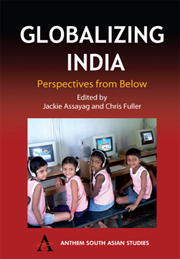Book contents
- Frontmatter
- Contents
- List of Contributors
- Acknowledgements
- 1 Introduction
- Part One Economy and Agriculture
- Part Two Education and Language
- Part Three Culture and Religion
- 8 Maps of Audiences: Bombay Films, the French Territory and the Making of an ‘Oblique’ Market
- 9 Malabar Gods, Nation-Building and World Culture: On Perceptions of the Local and the Global
- 10 Globalizing Hinduism: A ‘Traditional’ Guru and Modern Businessmen in Chennai
- Bibliography
9 - Malabar Gods, Nation-Building and World Culture: On Perceptions of the Local and the Global
from Part Three - Culture and Religion
Published online by Cambridge University Press: 05 March 2012
- Frontmatter
- Contents
- List of Contributors
- Acknowledgements
- 1 Introduction
- Part One Economy and Agriculture
- Part Two Education and Language
- Part Three Culture and Religion
- 8 Maps of Audiences: Bombay Films, the French Territory and the Making of an ‘Oblique’ Market
- 9 Malabar Gods, Nation-Building and World Culture: On Perceptions of the Local and the Global
- 10 Globalizing Hinduism: A ‘Traditional’ Guru and Modern Businessmen in Chennai
- Bibliography
Summary
The term ‘globalization’ resists attempts at narrow definition. Although discourses on the subject appear to relate to something ‘happening out there’ (Harriss 2001), its meanings are so diverse that a single definition proves elusive. However Baricco (2002) suggests that despite problems both of definition and understanding, we nevertheless have little difficulty in being for it or against it.
This can generate strange worlds. Ulf Hannerz cites the example of the winning song in a 1987 national song contest in Sweden, which excited strong protests not because it was a calypso sung by a Finn but because for some people its refrain, ‘Four Bugg [a brand of chewing-gum] and a Coca-Cola’, represented ‘cultural imperialism’, a ‘cocacolonization of the world’ (Hannerz 1989). Thus globalization may be understood as a euphemism for US imperialism (Harriss 2001), while various cultural hybrids might go unnoticed. This aspect of globalization is generally condemned. Other aspects – for instance, the need for universal cultural values – are often seen as desirable without a contradiction being perceived. Thus in the issue of Economic and Political Weekly containing Harriss's critique of the effects of economic globalization, we also find a debate about the right to disregard national sovereignty in order to safeguard monuments which ‘are part of a cultural heritage of humankind as a whole’ – in this case, the Bamiyan Buddhas (Hensman 2001). Reactions therefore vary according to what is globalized.
- Type
- Chapter
- Information
- Globalizing IndiaPerspectives from Below, pp. 185 - 210Publisher: Anthem PressPrint publication year: 2005
- 11
- Cited by

